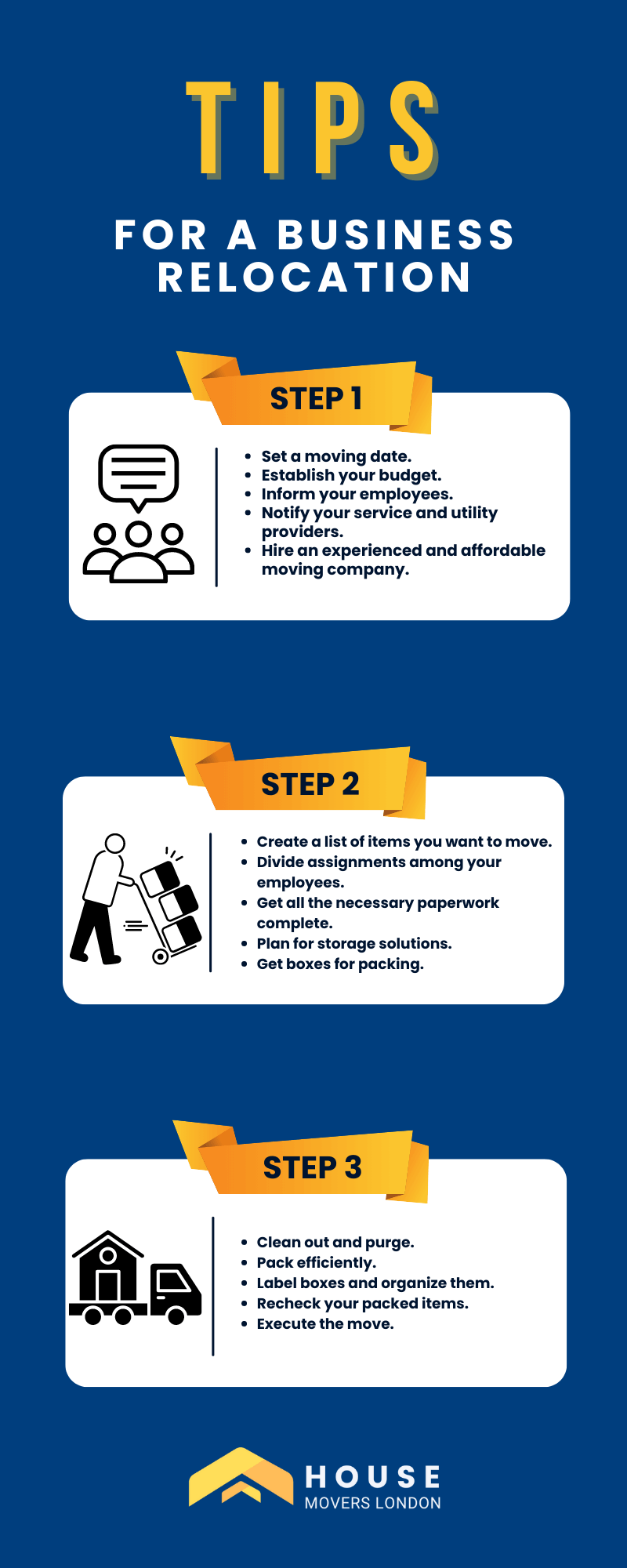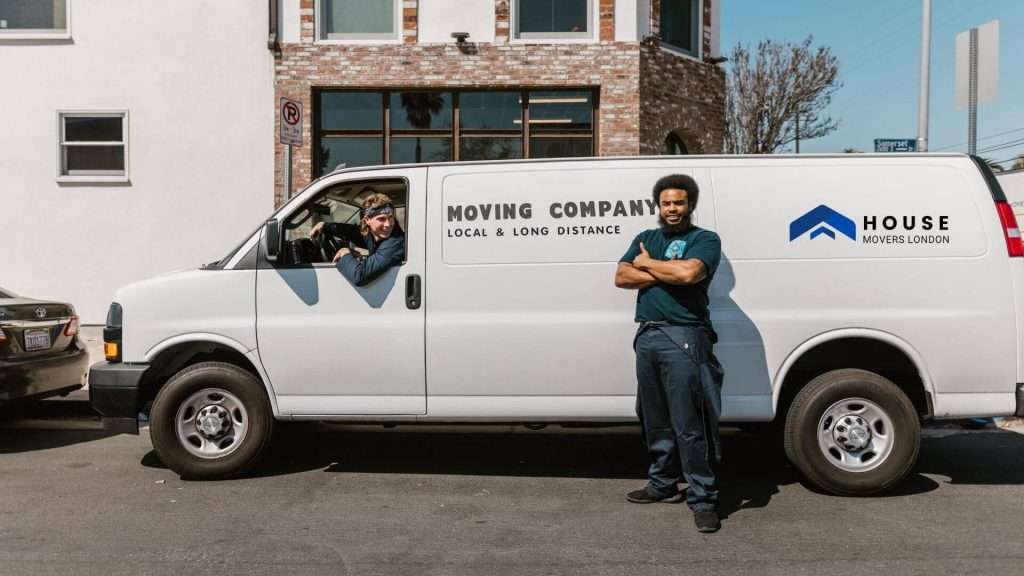Save up to £80 on your removals service. Request a Free Quote Today!
A Guide to Preparing for Your Upcoming Office Relocation
Now that you have moved your business to new premises, it is time for you to make preparations. This is no easy task, but it’s one that must be done well. If you don’t prepare properly, your relocation could be a nightmare. You could end up spending more money on the job than you need to, and your business could suffer as a result.

If you are ready for your office relocation, here are some tips that will help you in preparation for your business move in below easy steps:
Set a moving date
You should have a moving date in mind before you start planning. Moving day can be stressful, so it’s a good idea to give yourself plenty of time to get everything done.
If possible, schedule the move for a day when there is little or no business traffic so that you won’t be interrupted during the time of your office move.
You should also avoid moving on a holiday or when schools are closed. This will help ensure that you don’t have to contend with traffic and crowds of children.
Establish your budget
If you’re moving into a new office space or relocating your current office, you need to set a budget and stick to it. This will help keep your costs down while making sure that you have everything you need when the day comes.
You can find out how much office movers charge for their services by calling around and asking for a quote.
Establishing an approximate cost of moving supplies is also helpful so that you know what items are worth purchasing on your own rather than renting from a company.
Inform your employees about the relocation
If you’re moving your office, it’s important to inform your employees about the move as soon as possible. This will give them time to make arrangements for their own personal items and will also allow them to prepare for any changes in workload or commute.
You should also consider holding an all-staff meeting where you can explain the reasons behind the move, discuss how it will affect employees and answer any questions they may have regarding it.
This meeting can also be a good opportunity to introduce new company policies and initiatives. If you’re moving your business, it’s important that you take the time to plan ahead.
By doing so, you’ll ensure that everything goes smoothly during your relocation and set yourself up for success in your new space.
Notify your service and utility providers
It’s important that you notify any service or utility providers about the move so they can make any necessary adjustments in advance. For example, if your business relies on a water line, internet connection, or phone system, it’s important to let these companies know when you expect to leave your current location so they can arrange for maintenance or repairs as needed.
You should also contact your insurance provider to let them know that you’re relocating, especially if you have a business owner’s policy.
If there are tenants in the home or apartment, let your landlord know that they need renter’s insurance and ask who their insurer is so it can be added as an additional named insured on all policies for the new location.
Hire an experienced moving company

If you’re moving an entire office or company, then consider using business movers instead of going solo. This is especially true if you have a lot of equipment or inventory to move. A professional moving company will help ensure that your belongings are packed, transported, and unpacked safely.
They can also provide packing supplies if needed. The best way to find an affordable moving company is to ask friends and family members for recommendations. You can also check out reviews online. If you are moving locally, there are usually a number of options available in your area.
Create a list of items you want to move
This is the step that can really make or break your move. Create a list of items that need to be transported by your hired moving company and be sure to check it twice. This list will help you avoid leaving anything behind or forgetting important items when you move into your new office space.
The list should include any furniture and equipment that needs to be moved, as well as personal belongings of employees that they want to take with them. You also need to make sure that your list includes all of the accessories needed for each item on it, such as cables, cords, and other small accessories.
Divide assignments among your employees

If you have multiple people working in different departments or divisions, it’s important to assign tasks based on their areas of expertise, like packing and cleaning, and what not to move. For instance, if your IT department is moving into a new office space and there are computers that need to be relocated, assign this task to one of your IT staff members to pack everything from their departments.
This will help your team stay focused on their tasks and prevent any confusion or miscommunication from occurring. Also, make sure that you don’t overburden any one employee with too many tasks. Make sure everyone knows what they need to do, when they need to do it, and how much time they have to complete each task.
Get all the necessary paperwork complete
To avoid any confusion or problems, make sure you have all the necessary paperwork completed before you move in—copies of your lease agreement and proof that you’re allowed to sublet (rent out) your office space.
You’ll also want to make sure that your sublet agreement is signed and dated by both parties. This will protect you in the case of any disputes later on.
Plan for storage solutions

If you’re planning on storing any items of your office, make sure you do so in an organized way. You don’t want to be tripping over boxes and supplies when you’re trying to work anywhere. If possible, store your items offsite at a storage facility or with family members who live nearby.
That’s how you can handle all your business files, supplies, and equipment. The less clutter you have in your office space, the better.
Get boxes for packing
Before you start your office move, be sure to have plenty of packing boxes on hand. Don’t wait until the last minute—you don’t want to be scrambling around trying to find them! You might even consider asking a friend or family member if they can donate some items for your office move.
Keep in mind that you may need different sizes of boxes depending on the size of items being packed, so be sure to have enough on hand before beginning your move. If you can’t find boxes yourself, ask your moving company for some.
Clean out and purge
When it comes time to relocate your workplace, you won’t have to bother packing up everything. That’s because you should clean out your office first. This will help you limit the quantity of inventory that has to be transferred while also making it easier to assess which goods are significant enough to be preserved and which may be dumped. It will also assist you in determining if you want to donate or discard any goods.
Pack efficiently
If you’re like most business owners, then you have a lot of stuff. You may have to pack and move your entire office or just a few items from one location to another. Whatever the case may be, it’s important that you pack efficiently so that you don’t waste time or money on unnecessary packing supplies.
For example, you can pack a box with several smaller items that are similar in size and weight. If you’re packing electronic equipment, then it’s best to use bubble wrap and foam peanuts rather than newspaper or paper towels.
Label boxes and organize them by the department

If you have a large office, then it’s important that you organize the boxes by department. For example, if you have a large sales team that needs to move their items into a new office space, then label each box with the name of the department and where it should be placed once unloaded from the truck.
This will make unpacking much easier since all of your equipment will be in one place instead of scattered throughout several rooms.
Recheck your packed items
Once you’ve packed up all your belongings, it’s important to take a step back and recheck that everything is there. You don’t want to discover a missing item once you arrive at your new office.
Another important reason to recheck is that you may have forgotten something important and need to go back for it. For example, if you pack up a few extra boxes and leave them in your old office’s conference room or storage area, don’t forget them when moving out.
Execute the move

It’s time to put your preparations into action now that you’ve completed them. Before the move, make sure everyone understands which belongings are theirs or hers, so no furniture is left behind before the moving vehicle comes. Following that, load all of your possessions onto the moving truck on the agreed-upon day and time—and then relax while unpacking!
Additionally, upon arrival at the new workplace, if you have an office manager or someone who is familiar with the layout of your building, ask them for assistance in arranging goods.

